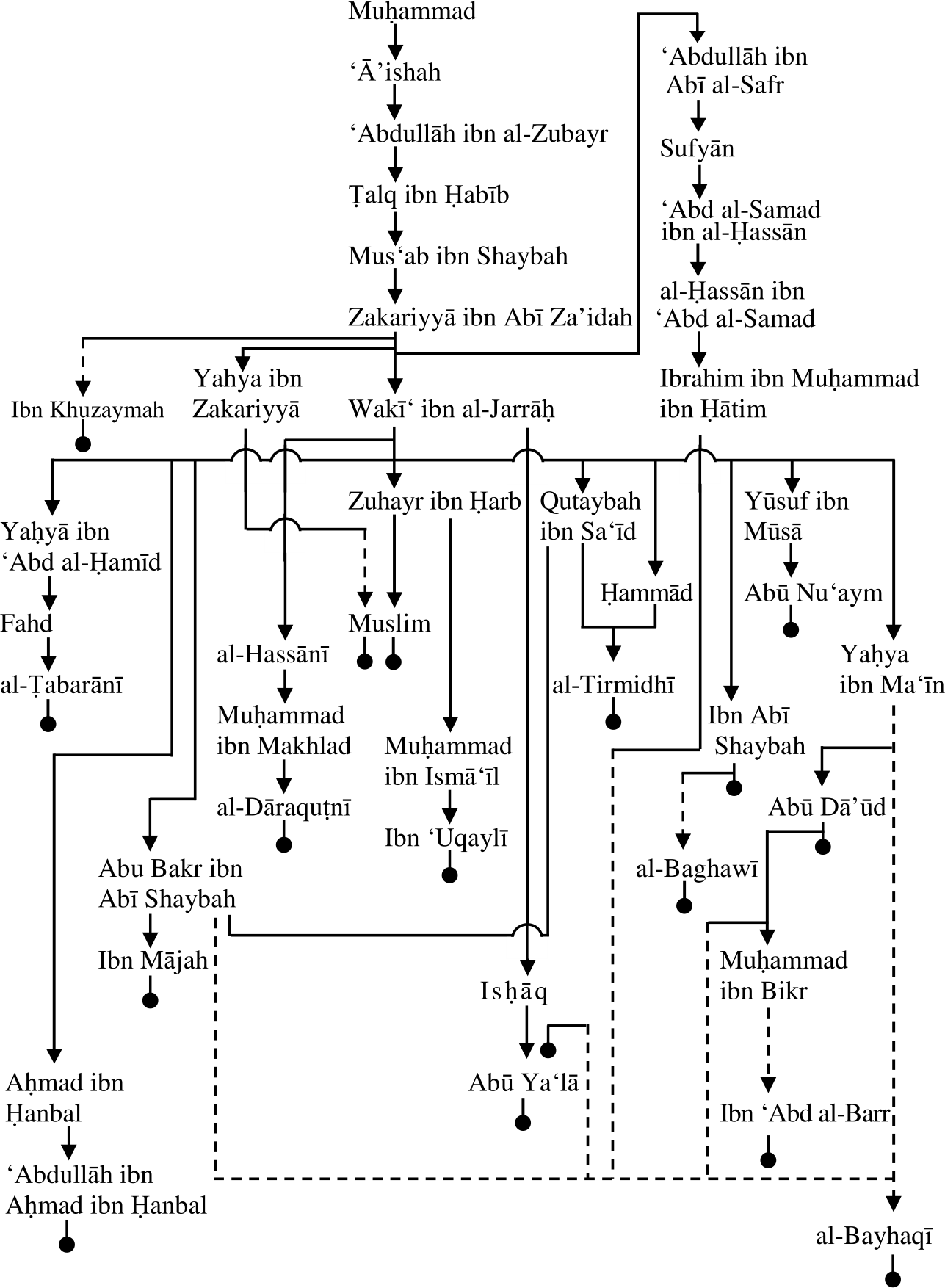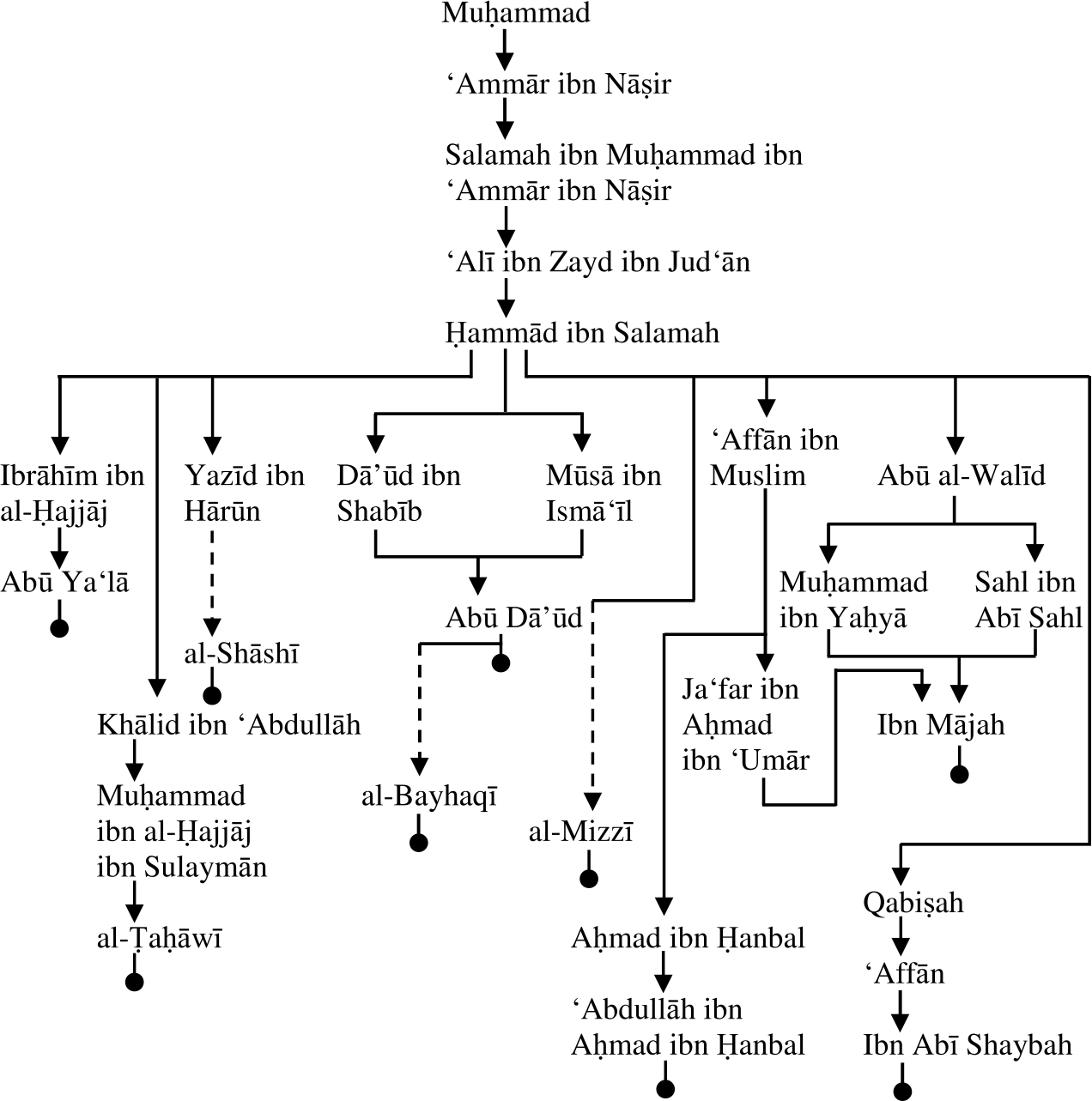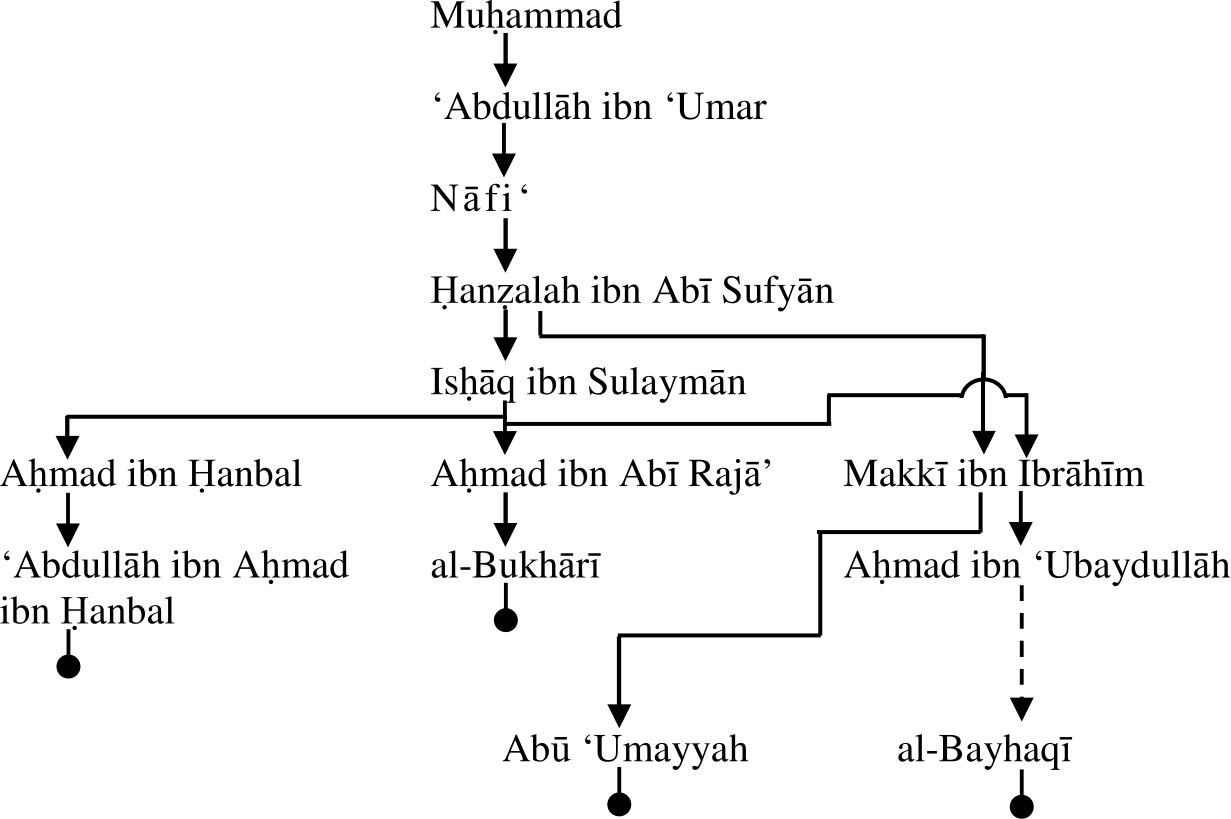1. Ā’ishah
(rta)
حدثنا قُتَيْبَةُ بن سَعِيدٍ وأبو بَكْرِ بن أبي شَيْبَةَ وَزُهَيْرُ بن حَرْبٍ
قالوا حدثنا وَكِيعٌ عن زكريا بن أبي زَائِدَةَ عن مُصْعَبِ بن شَيْبَةَ عن طَلْقِ
بن حَبِيبٍ عن عبد اللَّهِ بن الزُّبَيْرِ عن عَائِشَةَ قالت قال رسول اللَّهِ صلي
الله عليه وسلم عَشْرٌ من الْفِطْرَةِ قَصُّ الشَّارِبِ وَإِعْفَاءُ اللِّحْيَةِ
وَالسِّوَاكُ وَاسْتِنْشَاقُ الْمَاءِ وَقَصُّ الْأَظْفَارِ وَغَسْلُ الْبَرَاجِمِ
وَنَتْفُ الْإِبِطِ وَحَلْقُ الْعَانَةِ وَانْتِقَاصُ الْمَاءِ قال زكريا قال
مُصْعَبٌ وَنَسِيتُ الْعَاشِرَةَ إلا أَنْ تَكُونَ الْمَضْمَضَةَ
‘Ā’ishah
stated that God’s Messenger said: “Ten things are from among human nature:
clipping the moustache, lengthening the beard, using the tooth-stick, sniffing
air in the nose, pairing nails, washing knuckles, shaving hair from underarms
and the pubes, cleaning the private parts with water.” Mus‘ab said: “I forgot
the tenth except that it may be rinsing the mouth.”
Following is
the schematic illustration of the isnad of this narrative’s variants:

About Mus‘ab
ibn Shaybah, al-Mizzi records: Ahmad ibn Hanbal says that he narrates manakir;
Yahya ibn Ma‘in regards him to be trustworthy; Abu Hatim says that authorities
do not like him (la yahmidunahu) and that he is laysa bi qawi; al-Nasa’i says
that he is munkar al-hadith and at another instance says that fi hadithihi
shay’. Al-Dhahabi records that according to
al-Daraquṭni, he is laysa bi al-qawi and Abu Da’ud calls him da‘if.
Ibn Hajar records that in the view of Ibn ‘Adi authorities have questioned his
memory but al-‘Ijli regards him to be trustworthy.
Ibn Hajar himself regards him to be layyin al-hadith.
Zakariyya ibn
Abi Za’idah is a mudallis
and all his variants except the one recorded by Ibn Khuzaymah
have his ‘an‘anah.
No information
is available on al-Hassan ibn ‘Abd al-Samad and Ibrahim ibn Muhammad ibn Hatim.
Al-Nasa’i is of
the view that the mawquf version of this narrative is more correct.
2. ‘Ammar ibn Nasir (rta)
حدثنا سَهْلُ بن أبي سَهْلٍ وَمُحَمَّدُ بن يحيى قالا ثنا أبو
الْوَلِيدِ ثنا حَمَّادٌ عن عَلِيِّ بن زَيْدٍ عن سَلَمَةَ بن مُحَمَّدِ بن
عَمَّارِ بن يَاسِرٍ عن عَمَّارِ بن يَاسِرٍ أَنَّ رَسُولَ اللَّهِ صلى الله عليه
وسلم قال من الْفِطْرَةِ الْمَضْمَضَةُ وَالِاسْتِنْشَاقُ وَالسِّوَاكُ وَقَصُّ
الشَّارِبِ وَتَقْلِيمُ الْأَظْفَارِ وَنَتْفُ الْإِبْطِ وَالِاسْتِحْدَادُ
وَغَسْلُ الْبَرَاجِمِ وَالِانْتِضَاحُ وَالِاخْتِتَانُ حدثنا جَعْفَرُ بن أَحْمَدَ
بن عُمَرَ ثنا عَفَّانُ بن مُسْلِمٍ ثنا حَمَّادُ بن سَلَمَةَ عن على بن زَيْدٍ
مثله
‘Ammar ibn
Yasir reported that God’s Messenger said: “From among human nature is rinsing
the mouth and nostrils, using the tooth stick, clipping the moustache, pairing
nails, shaving the pubes and underarms, washing joints, cleaning the private
parts with water and circumcision.”
Following is
the schematic illustration of the isnad of this narrative’s variants:

Ibn Hibban says that this narrative is mursal and that
Salamah ibn Muhammad ibn ‘Ammar ibn Yasir narrates from his father (as is the
case with the narrative under discussion) while he has not even seen him. He
further says that he is not worthy of being adduced from when he is in harmony
with trustworthy narrators because of this irsal.
Al-Mizzi records the following jarh on ‘Ali ibn Zayd ibn
Jud‘an: Ibn Sa‘d’s view about him is fihi du‘f wa la yuhtajju bihi; Salih ibn
Ahmad ibn Hanbal reports his father’s opinion as: laysa bi al-qawi . Others have
reported Ahmad ibn Hanbal as: laysa bi shay’ and da‘if al-hadith; Yahya ibn
Ma‘in says that he is laysa bi dhak al-qawi ; other opinions attributed to Yahya
ibn Ma‘in about ‘Ali ibn Zayd are da‘if, da‘if fi kulli shay’, laysa bi shay’,
laysa bi hujjah; Al-‘Ijli opines: yuktabu hadithuhu wa laysa bi al-qawi;
according to Ibrahim ibn Ya‘qub al-Juzjani, he is wahi al-hadith, da‘if and la
yuhtajju bihi; in the opinion of Abu Zur‘ah, he is laysa bi al-qawi, and in the
opinion of Abu Hatim, he is laysa bi qawi yuktabu hadithuhu wa la yuhtajju bihi;
Al-Nasa’i says that he is da‘if; Abu Bakr ibn Khuzaymah says: la yuhtajju bihi
li su’ hifzihi; Al-Hakim expresses his opinion as: laysa bi al-matin ‘indahum;
Al-Daraquṭni says: fihi lin; Shu‘bah’s opinion about him is kana raffa‘an;
Hammad ibn Zayd says about him: kana yuqallibu al-ahadith; Ibn ‘Uyaynah and
Wuhayb have yuda‘‘afu him; Abu Wuhayb says: kana ha’ikan.
Ibn Hibban after citing his jarh on him says istahaqqa al-tark
al-ihtijaj bihi.
Ibn Hajar says that he is da‘if.
A related variant to the above two narrative reads:
حدثنا أَحْمَدُ بن أبي رَجَاءٍ حدثنا إِسْحَاقُ بن سُلَيْمَانَ قال سمعت حَنْظَلَةَ
عن نَافِعٍ عن بن عُمَرَ رضي اللّٰه عنهما أَنَّ رَسُولَ اللّٰهِ صلي اللّٰه عليه
وسلم قال من الْفِطْرَةِ حَلْقُ الْعَانَةِ وَتَقْلِيمُ الْأَظْفَارِ وَقَصُّ
الشَّارِبِ
‘Abdullah ibn
‘Umar reported from God’s Messenger: “From among human nature is shaving the
pubes, pairing nails and clipping the moustache.”
Following is
the schematic illustration of the isnad of this narrative’s variants:

Al-Bukhari’s
variant is without flaw.
___________
|